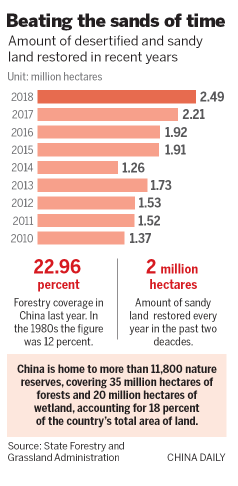Desert reclamation builds a green and pleasant land


Higher incomes
As the land has gradually been covered by greenery, the improved environment, including forests and grassland, has also benefited local people through better living conditions, and green industries have provided higher incomes.
In recent years, the region of the Three-North Shelterbelt Program has become a production base for various fruits and nuts, including jujube, apples, walnuts and Chinese chestnuts, generating annual income of about 120 billion yuan ($16.8 billion) for residents.
Statistics from the State Forestry and Grassland Administration show that the revenue generated by the forestry industry reached 7.33 trillion yuan last year, and 158 million farmers have benefited from the Conversion of Cropland to Forest and Grassland Program, seeing disposable incomes rise by 14.7 percent in the past 10 years.
"Forest tours are an emerging trend with great potential. As people become more prosperous, they care more about a healthy life and want to be closer to nature," said Cheng Hong, deputy director of the administration's Forest Tourism Office.
He said forest tourism and the related health sector saw a boom last year, registering a 15 percent rise in consumers compared with 2017, bringing in revenue of about 1.5 trillion yuan.
At the Babusha Forest Station, the younger generation is exploring creative ways to generate more income by introducing new businesses to desertified land. Guo Xi, 34, the youngest ranger at the station, wants to control the sand via new methods, like planting herbs and raising pollution-free stock, such as chickens and a small number of turkeys.
Online research has allowed Guo and his colleagues to study the skills required to graft cistanche, a valuable herb that can be grown on saxaul, a tree that thrives in deserts.
"We sow the seeds of the trees and herbs at the same time. They both control desertification. And we can make extra income by selling the precious herbs," Guo said.
"Also, I've taught local residents to grow jujube and Chinese wolfberry-two popular healthy fruits that sell for high prices."
Through social media Guo learned about the rising demand for organic meat among urban residents, so he launched a trial last year in which he raised 5,000 chickens on the farm.
"The chickens eat insects and their droppings fertilize the grass and trees, which is a win-win business model in sandy areas," he said.
The chickens, priced at 100 yuan each, have brought the farm tens of thousands of yuan in extra income. However, a lack of packaging and processing facilities means they can only be sold within the county.
After Guo posted a short video of the chickens, residents of other cities and provinces messaged him to ask if they could purchase the poultry via an e-commerce platform.
"President Xi Jinping has said that lucid waters and lush mountains are invaluable assets. In recent years, we have more deeply understood the meaning of that saying, and can definitely feel the benefits that nature and the good environment are giving us," Guo said.
"I believe more young people will join our efforts to green the country and build our home into a really beautiful China."
- China planning to raise age limit for blood donors, shorten the minimum interval
- Breakthrough in BMI tech aids patients
- Chinese technique for making ultrathin metal films named top 10 scientific breakthroughs
- Former senior political advisor of Sichuan sentenced to 14 years
- Beijing has undergone dramatic improvements since 2017's revamped development plans
- AI open alliance launched to pool resources for innovation and application





































